A gastroenterologist and microbiome researcher who has promoted hydroxychloroquine and ivermectin as COVID treatments has lost a paper after a sleuth reported differences between the article and the registered protocol of the clinical trial it purported to describe.
The retracted article, on detecting SARS-CoV-2 in fecal samples, was published in Gut Pathogens in January 2021. It marks the fourth retraction for study coauthor Sabine Hazan.
Hazan is founder and CEO of ProgenaBiome, a laboratory in Ventura, Calif., advertising clinical trials exploring the role of the gut microbiome in conditions including autism and Alzheimer’s disease, as well as COVID. She is also CEO of Ventura Clinical Trials, which lists dozens of pharmaceutical and biotech companies among its clients.
Hazan has nearly 200,000 followers on X, where she reposts messages from the account “ScienceGuardians” critical of PubPeer and sleuths. She also recently promoted an abstract she published purporting to find a decrease in a particular type of gut bacteria in four people after they received COVID vaccines.
Her other retractions include a paper that proposed ivermectin worked as a COVID therapeutic via the microbiome, and clinical trials of ivermectin and hydroxychloroquine-based drug combinations for the disease. All followed comments on PubPeer from sleuths, including Elisabeth Bik.
In a phone call, Hazan acknowledged “mistakes” in the Gut Pathogens paper, but said she believed the article could have been corrected rather than retracted. “We did everything by the book in that paper,” she said. She called the many PubPeer comments on her papers “harassment.”
The Gut Pathogens paper has been cited 14 times, according to Clarivate’s Web of Science. Altmetric, a data service which tracks the online attention research articles receive, ranks the article in the top 5 percent of all articles it has scored, based on mentions in news articles and on social media platforms such as X, which include criticism of the work.
The journal editors retracted the paper on May 22. The notice stated:
After publication discrepancies between the registered protocol of the trial and the work reported in the article were noted and the authors were unable to provide documentary evidence of ethical approval for the changes made to the protocol. Concerns were raised regarding the accuracy of the stated study period as samples were collected prior to the registration of the study and collected after the study period had ended. Furthermore, a number of participants did not meet the stated inclusion criteria but were still included in the study. None of the authors have responded to any correspondence from the editor about this retraction.
Sleuth Kevin Patrick first posted on PubPeer about the article in December 2022, using his account named “Actinopolyspora biskrensis.” His post asked the authors to comment on “some apparent discrepancies between the study design described in the registered clinical trial and the study reported upon in this paper.” For example, he noted it seemed four of the study’s 14 participants “did not meet the definition for inclusion in the study but were included in the paper’s results.”
Patrick added several more comments in January 2023, questioning both the author’s statement they had no competing interests and the ethical approval for the trial. He also pointed out the authors referenced an observational study of hydroxychloroquine for hospitalized COVID patients that concluded “the results do not support the use of hydroxychloroquine at present,” used to support the authors’ assertion “numerous other studies have also reported the efficacy” of the drug for COVID.
Patrick emailed the publisher, Springer Nature’s BioMed Central, to alert them to the PubPeer posts as he left them, but received no response. This April, more than two years later, he followed up to ask whether the paper had been investigated.
William Shadbolt, senior publisher at Springer Nature, responded, writing, “We have already been alerted to this paper.” Shadbolt wrote he could not comment on ongoing cases, but said he would share any updates.
On social media, Hazan has pointed out Patrick has “no medical training or scientific credentials and therefore shouldn’t have any role in post publication peer review,” Patrick told us.
“I argue the opposite: if even I (with no medical training or scientific credentials) can find fatal flaws in research that authors are unable to address to the satisfaction of the editors, the problem isn’t me,” he said.
We reached out to Niyaz Ahmed, editor in chief of Gut Pathogens, and received a statement from Michael Stacey, head of communications for journals at Springer Nature:
We were alerted by a reader to concerns raised about this paper on PubPeer. We take such concerns extremely seriously and immediately commenced a thorough investigation into the matter following an established process and in line with the Committee on Publication Ethics (COPE) best practice. The investigation was conducted by the journal editors with support from the Springer Nature Research Integrity Group.
Once the investigation was complete, we concluded that the most appropriate action to take was retraction of the paper, as there were significant discrepancies between the registered clinical trial protocol and the protocol as described in the published paper.
Hazan disputed the notice’s statement that the authors didn’t show they had the necessary ethical approvals. “Bullshit,” she said. “We sent them the papers.”
She initially offered to share her email exchanges with the journal to demonstrate the authors had replied to all the editors’ comments and were told the situation was “all clear” — but weren’t informed of the retraction decision.
More than two weeks later, she still had not shared the correspondence but sent us an email asserting “Retraction Watch has been publicly implicated in an alleged multi-stage campaign that includes anonymous smear tactics, selective amplification, and close coordination with PubPeer-affiliated actors, including those using false identities and operating allegedly fraudulent accounts,” citing a Science Guardians post that contained numerous false allegations and vague insinuations. Science Guardians is an anonymous social media account that has rebuffed all requests to be transparent.
As a condition of responding to our inquiry about sharing the emails, she asked Retraction Watch to “clarify” the “editorial safeguards and independence policies” for our coverage of cases involving PubPeer, and the “specific affiliations, funding sources, or professional connections” between us, PubPeer, “and the so-called ‘sleuths’ you routinely cite.” She also asked how we “intend to ensure journalistic fairness and context, particularly when writing about researchers targeted by these coordinated and anonymous campaigns.”
In response, we shared links to our published editorial independence policy and tax returns for the Center for Scientific Integrity, Retraction Watch’s parent nonprofit organization, which we have made public every year.
Hazan charged we “did not address the specific points I raised regarding conflicts of interest and editorial safeguards,” particularly regarding our cofounder Ivan Oransky’s volunteer position on the board of the PubPeer Foundation. We disclose that relationship in stories when relevant.
Hours later, Hazan sent us a document with a formal response to the retraction, including a few emails between the corresponding author of the paper and Shadbolt, of Springer Nature. The emails include the authors’ responses to the questions Patrick raised on PubPeer and Shadbolt’s acknowledgement of receiving them, but no communication about the outcome of the publisher’s investigation.
On the phone, Hazan said the attention to her papers on PubPeer and retractions interfered with her research and ability to publish.
“That was a landmark study,” she said. “It hurts me to my core, to the point I’m like, ‘Maybe I should stop.’”
Initially, Hazan told a Retraction Watch reporter to “Go back to your editors and say, ‘Dr. Hazan is not interested in being a punching bag.’” She later apologized for taking out her “anger” on the reporter.
Like Retraction Watch? You can make a tax-deductible contribution to support our work, follow us on X or Bluesky, like us on Facebook, follow us on LinkedIn, add us to your RSS reader, or subscribe to our daily digest. If you find a retraction that’s not in our database, you can let us know here. For comments or feedback, email us at [email protected].


Dr. Hazan could easily share all of the data and documentation she claims she has. I requested this 2 1/2 years ago and I still have not seen it. The fact that she would prefer to let the paper be retracted rather than be transparent is perplexing. It’s a bit similar to the Epstein papers, people get more suspicious when not everything is shared.
“no medical training or scientific credentials and therefore shouldn’t have any role in post publication peer review,”
Seriously?
Facts are facts, and nothing that the guy posted is a matter of opinion.
Clearly Dr. Hazan has not taken her science learning as seriously as she has taken the importance of her credentials.